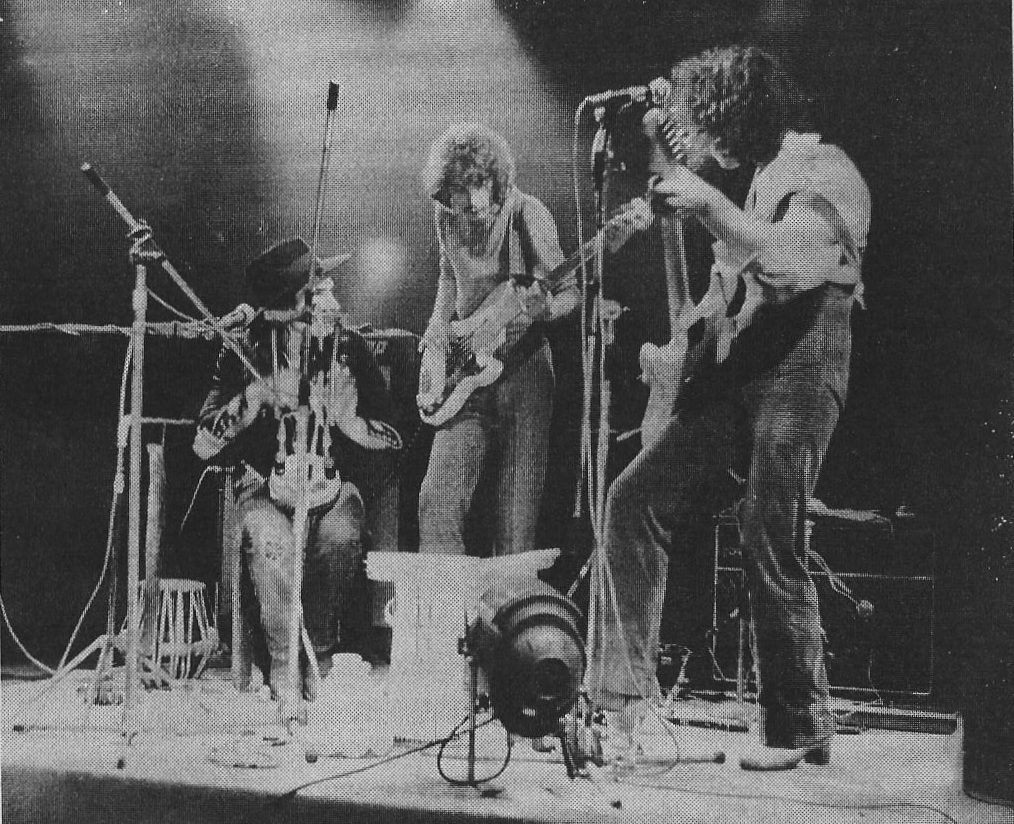
T. Rex: Three Musicians, a Total Spectacle
Marc Bolan: "When we perform somewhere, we do not care that people shout, applaud, sing along to 'Ride A White Swan' . The key is that they have a good time."
The audience packed in La Taverne de l’Olympia gave triumphant approval to Marc Bolan and his two musicians. T.Rex are living evidence that Pop music is not necessarily synonymous with tons of stage gear. T.Rex will be broadcast on the Pop 2 TV program on Saturday 13th.
Jacques BARSAMIAN
Initially, the group - admired by some, hated by others for the oddity of their music and sometimes pedantic lyrics - was composed of Marc Bolan, guitarist and singer, and Steve Peregrine Took, percussionist.
Tyrannosaurus Rex, as they were named then, started around the same time as Pink Floyd, and both often performed on the same stage. A little more than one year ago, Steve was replaced by Micky Finn. Former student of Fine Arts in Croydon, Micky abandoned his studies because he did not accept how students were exploited. He participated for a while setting up displays in several shops, including the Beatles Apple shop. Playing various percussion instruments, he recorded an LP with the band, ‘Hapshash And The Coloured Rain’. The record didn’t find any success. Then he met Marc Bolan in a restaurant.
Marc Bolan was kind enough to answer our questions.
Q.- When Steve left you, and before you meet Micky, did you not feel lonely?
MB. - I've always had confidence in myself. For most people, Tyrannosaurus Rex has always been me. I knew I’d find some day a guy that could support me. I did not find anyone better than Micky. Our collaboration seems to work well.
Q. - In addition to an easier life, what brought you the success of "Ride A White Swan"?
MB: We do not play in front of a small, almost selected, audience anymore, but for the general audience. We conquered a large amount of people who, even yesterday, were not aware of us.
Previously, when I was with Steve, we almost made it twice, entering the charts with “One Inch Rock”, for instance. But it is only "Ride A White Swan" that allowed us to prove that we were one of the best bands in current Pop music. Now lots of people greet us, many photographers come for us, unknowns shake our hands and congratulate us. I hope, however, that we will not meet the same misfortune as Free. This group was number one last summer, and now they are totally forgotten.

Q. - Your album, anyway, seems to do well already.
MB: I would have liked it to be more rock. This does not mean that we would like singing "Long Tall Sally" ... but it is difficult to change dramatically without disappointing all those who followed us since our debut. We were thinking of them a lot too, when recording this LP. There is another change from our previous albums: the lyrics are much shorter.
Q. - "The last of the great groups of the Underground" - this is how some journalists nicknamed you.
MB – Some bands are labeled as "underground" in France or in England, while in the United States they are simply considered as Pop. This is the case of the Doors, Steppenwolf, Blue Cheer, to name only three.
We tend to label as “avant-garde” bands who, in fact, merely play what they’ve learned to play since they are interested in music - be it Rock, Blues, Folk or Jazz or Classical. I think of Jimmy Page and Led Zeppelin as those, although I have a certain admiration for them. Much more than for people like Black Sabbath, for instance.
Q. For you, the scene is very important, I think.
MB: Yes, and that's why we use a special stereo sound. Many in our young audience cannot afford a home stereo. Our sound provides a superior atmosphere to our shows, and allows us to achieve a number of effects with our instruments. When we perform somewhere, we do not care that people shout, applaud, sing along to Ride A White Swan ". The key is that they have a good time. A show is a kind of liberation for everyone involved; that is why it must be total.
Q. You also give great importance to TV?
MB: This is the most convenient way to make yourselves known to the public, adults as well as teenagers. Some criticize shows like Britain's “Top Of The Pops”. But without programs like this, bands such as Family or T. Rex, would they be as famous as they are now in England?
Q. Yet the ways to achieve fame have changed dramatically in a few years.
MB: Yes, but much more at the production level than at promotion. Obviously, musicians like us can achieve success in 1971 with songs of their own composition. Guys like Lennon or Pete Townshend of The Who now record their albums in their own studios. A lot of middlemen, who dominated the entire system four or five years ago, have more or less disappeared. Or at least they do not deal in the Pop music production they’re not aware of. This is not bad.
Q. I read somewhere that for you, there is no fame as long as someone does not break in the United States?
MB: You become an international star, indeed, once you’re really popular in America. Just look at all these English bands who made it in the United States. Their success over there generally had global repercussions in their careers. We recently were offered to tour the U.S. with the Who for one month. It's fantastic. With them, such a tour can only be extraordinary. And their guitarist Pete Townsend is one of my favorite musicians. So our future looks very promising!
Next : Pop Music #50
